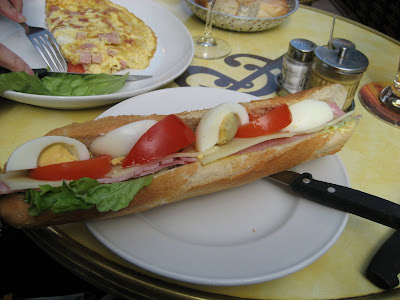
The charred remnants of Oradour-sur-Glane
The region of France called the Limousin, southwest of Paris, is not an area people go to, but one they go through. "It's like one of the flyover states in the U.S. Think of Indiana," is how one American who lives there put it. These days the Limousin is mostly known for its beef cattle and for being one of the most thinly populated areas in France. Its reputation as a sleepy backwater may be something of a liability today, but during World War II when France was occupied by the Nazis it was a blessing. That was probably how the residents of the tidy little market town of Oradour-sur-Glane saw it.
In 1944 they were surviving the war quite well. The village where they lived had no strategic value and, except for rationing, they were only marginally affected by the conflict. On the afternoon of June 10, 1944 it looked like even that inconvenience was due to end soon. The Allies had landed on the beaches of Normandy four days before. The Germans were pulling back. The war in Europe would be over in about six months.
But on that lovely Saturday afternoon, none of it would matter. There are variations on the story but facts everyone agrees with are as follows.
The village was busy that day because all the children were gathered in the schools for a health inspection. The young men were in town because ration coupons for tobacco were being distributed. Around 2 p.m. a convoy of about 180 SS troops, part of a Panzer division, rolled into town. Their commander told the mayor, a retired doctor, to round up everyone for an identity papers check.
Oradour is not a big place. You can walk end to end in about ten minutes. So it didn't take long for all the men women and children to gather at the grassy fairgrounds on the edge of the village [See photo at top of this page]. There were about 650 people. No one was particularly concerned. The village was under the jurisdiction of German puppet Vichy government and what little contact they had with German troops in the past had been innocuous.
After everyone was present the Germans changed their story, saying they were investigating rumors of arms and ammunition hidden in the village. They planned to conduct a building to building search. To keep them out of the way, they gathered up the women and children and marched them to the village church. To keep an eye on the village men, the Germans broke them down into smaller groups and marched them to barns and garages in the town. They posted machine gunners at each of the six locations.
Not long after this some soldiers walked into the church and set a large box with fuses dangling off it on the altar. Around four o'clock some sort of signal went off. Without warning the machine gunners at each of the six locations began gunning down the groups of unarmed Frenchmen in the barns and garages. The soldiers made a point of shooting waist high to make sure they would also kill any children who might be among the groups. After the fusillade, SS troops waded through the bodies, executing any who were still alive. Then they piled straw and wood on the bodies and set the pile of corpses on fire.
At the church, soldiers lit the fuses trailing out of the box and locked the door. An explosion released a thick cloud of black smoke. The women and children scrambled to the far corners to try and find a place to breathe. Seeing not all had suffocated to death, soldiers shot any survivors, firing through the church windows. They then tossed hand grenades into the church to finish off any still alive and lit the church on fire.
The next day the Germans set fire to every building in the village and left. A handful of people, through luck, courage or resourcefulness had escaped before and even during the shooting, but not many. Total confirmed dead was 642.
The people who came to town afterwards looking for friends and relatives said the air was fill with the nauseating odor of charred flesh. Bodies were so badly burned only 52 were identifiable.
To this day no one knows why this happened given other nearby villages were left untouched. One story has it that the German officer in charge mistook Oradour for another village with a similar name where members of the French Resistance were hiding. Another story is that he mistakenly heard the village had captured and killed a German officer. Since the officer died in battle a short time after the atrocity we will not know for sure.
After the war Charles de Gaulle visited Oradour and ordered that the village be left exactly as it is as a memorial to those slaughtered there. A new Oradour was built north of the site. And so it has been ever since.
We went to visit it. Even today the place is a scene of quiet horror and madness. This was a thorough, efficient, soulless execution of a town. There was just a handful of people wandering the empty streets the weekday we visited. Those few who talked spoke in whispers as they walked past the blackened shells of buildings. Most walked around in a kind of stunned silence. Among the crowd were two young men, tourists from Germany.
Some of what we saw:

Because the individual bodies were burned beyond recognitions all the corpses were deposited in a memorial in the town cemetery, essentially an ossuary. The age range of those murdered was from one week to 90 years old. Above is a typical memorial. Three generations of a family - parents, their daughter and her two young children - erased in minutes.













































